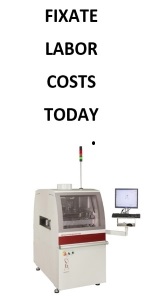Developing a Reliable Lead-free SMT Process
Published: |
January 3, 2008 |
Author: |
Peter Biocca, Senior Development Engineer, Kester. |
Abstract: |
Lead-free SMT can be achieved reliably if several process requirements are implemented carefully. Some of the variables to account for are listed below. The most common alloys used in lead-free SMT are tin-silver-copper alloys; these alloys all have a meting range between 217- 220°C. These alloys all melt at higher temperatures than traditional leaded solders such as the 63/37which has a melting point of 183 °C.... |
|
|
|
Company Information:
- Jul 20, 2017 - Reactivity Of No-Clean Flux Residues Trapped Under Bottom Terminated Components
- May 17, 2017 - How to Use the Right Flux for the Selective Soldering Application
- Dec 29, 2016 - Partially-Activated Flux Residue Impacts on Electronic Assembly Reliabilities
- Oct 23, 2012 - Lead-free SMT Soldering Defects How to Prevent Them
- Feb 13, 2009 - SnCu Based Alloy Design for Lower Copper Dissolution and Better Process Control
- See all SMT / PCB technical articles from Kester »
More SMT / PCB assembly technical articles »
- Apr 11, 2022 - iNEMI Webinar 07.07.2021 - PCB Cleaning | ZESTRON Americas

- Jan 28, 2022 - Open Radio Unit White Box 5G | Whizz Systems

- Nov 10, 2021 - Understanding the Cleaning Process for Automatic Stencil Printers | ITW EAE

- Oct 20, 2021 - PCB Surface Finishes & The Cleaning Process - A Compatibility Study | ZESTRON Americas

- Oct 06, 2021 - Cleaning Before Conformal Coating | ZESTRON Americas

- Browse Technical Library »
Developing a Reliable Lead-free SMT Process article has been viewed 513 times







